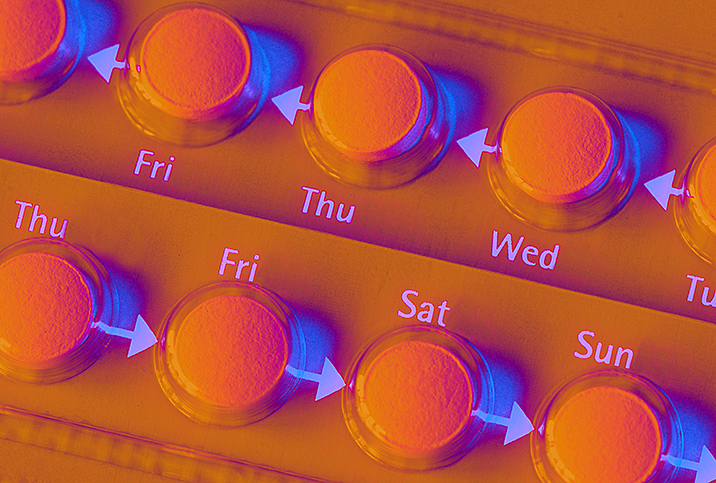Understanding the Blood Clot Risk of Hormonal Birth Control

Blood has an amazing ability to clot, which is a good thing when an injury occurs and needs to stop bleeding, said Betsy Greenleaf, D.O., F.A.C.O.G. However, when the blood clots on its own without an injury, this can be life-threatening. If the clot goes to the brain, it causes a stroke; the heart, a heart attack; or the lungs, an embolism—all of which can lead to death.
Hormonal birth control can lead to blood clots, but how worried should you be? According to the National Blood Clot Alliance, 1 in 3,000 women per year who are on birth control pills will develop a blood clot, with the risk being higher for women with certain underlying conditions. We talked to doctors to find out more about this dangerous side effect, and how to lower your risk.
Understanding the link between birth control and blood clots
"The hormones used in birth control are forms of estrogen and progesterone, the hormones that control the menstrual cycle," Greenleaf explained. "Birth control works by tricking the body by keeping these hormones at levels that prevent ovulation, or the release of an egg. No egg, no fertilization and no pregnancy.
"But these hormones have an effect on how our blood clots," Greenleaf continued. "In addition, the hormones found in birth control are synthetic, so in some people, these hormones can be metabolized in ways that cause inflammation in the body."
Greenleaf said the chemicals produced in the body when there is inflammation can also trigger clotting of the blood. Additionally, some people on birth control can be genetically predisposed to clotting issues, which can be made worse with birth control.
Birth control also increases the estrogen level in the body, which can lead to blood clots. The risk of blood clots is lower than it was in the past because the dose of estrogen used in birth control pills has been reduced. However, the FDA warns that combination pills (those that contain both estrogen and progestin) that use the type of synthetic progesterone called drospirenone may have an increased risk of blood clots compared to other combination pills that contain other types of progestin.
'Birth control also increases the estrogen level in the body, which can lead to blood clots.'
"Interestingly, progestin-only birth control has not demonstrated an increased risk of clotting over that of the general population," Greenleaf added.
However, progesterone-only pills are not as effective at controlling periods and you could have abnormal bleeding while using these pills, explained Greg Marchand, M.D., F.A.C.O.G., a board-certified OB-GYN. The progestin-only pill also needs to be taken at the same time each day in order to be most effective, which means missing a pill is riskier if you're trying to prevent pregnancy.
Research has suggested that other forms of hormonal birth control, specifically the patch and vaginal ring, carry approximately the same risk of blood clots as the combination pill.
Weigh the risks before worrying
"From a blood clotting risk, any birth control that does not use hormones would be safer," Greenleaf said. "These would include condoms, spermicides, the new vaginal acidifier birth control, Phexxi, hormone-free IUDs, birth control apps, and abstinence."
"You should definitely discuss which form of birth control is best for you with your doctor," Marchand added. "While birth control pills are very popular, other methods are also very convenient for some patients."
However, it's important to note again that the risk of blood clots with hormonal contraceptives is very low. Greenleaf made clear the health risks and risks of clotting associated with pregnancy are much higher than with birth control.
"Women are five times more likely to develop blood clots when pregnant [compared to when on birth control]," Greenleaf explained. "And as mentioned before, progestin-only birth control has not shown to increase the risk of blood clots if it is taken orally, and there is unclear data on the injectable form of progestin."
While the health risks of pregnancy far outweigh the risks of birth control for most people, it's important to know all of the risks related to any birth control method you're considering. Understanding the risks and data could ease your mind about the side effects.
"In general, women have a 1 to 5 out of 10,000 chance of developing a blood clot without being on birth control. Birth control increases this risk to a 4 to 20 out of 10,000 chance," Greenleaf said. "Statistically, these numbers are still considered very low—however, I always say to my patients, 'Who cares what the statistics are if you are the one person it happens to.'"
Taking a proactive approach to your health
While there is no cure for blood clots, there are a few things you can do to minimize your risk.
"If you are concerned about blood clots or have a family history of blood clots, I would highly recommend discussing this with your healthcare practitioner," Greenleaf said. "There are some simple blood tests to assess your clotting system and more advanced testing to look at some genetic risks of clotting."
Most importantly, Greenleaf said, is living a healthy lifestyle, which will decrease inflammation, one of the contributing factors to clotting risk.
Here are a few things that may help:
- Get eight hours of sleep.
- Drink approximately 96 ounces of caffeine-free, noncarbonated drinks daily, preferably water.
- Engage in stress reduction relaxation practices, such as meditation, yoga or a hobby such as reading.
- Avoid sugar, dairy, gluten and processed foods.
- Quit smoking, as smoking triggers systemic bodily inflammation.
Marchand advises maintaining an active lifestyle and reminded that blood clots are rare. "Birth control also has many benefits, including helping with acne and helping prevent ovarian cancer, so it is usually a good medication to be on," he concluded.


















